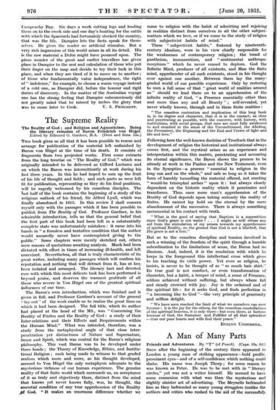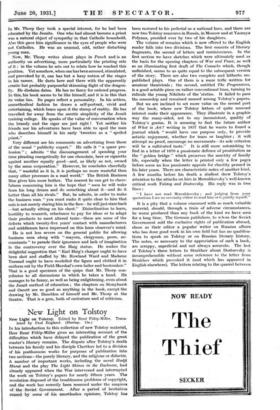A Man of Many Parts
Friends and Adventures. By "T" (of Punch). (Cape. 10s. 6d.) SOON after the beginning of the century there appeared in London a young man of striking appearance—bold profile, prominent eyes—and of a self-confidence which nothing could shake. His name was Joseph Thorp ; for some reason he was known as Peter. He was to be met with in " literary circles," yet was not a writer himself. He seemed to have some connexion with what was then the mysterious and slightly sinister art of advertising. The Meynells befriended him as they befriended so many young strugglers (unlike the authors and critics who rushed to the aid of the successful).
In Mr. Thorp they took a special interest, for he had been educated by the Jesuits. One who had almost become a priest was a natural object of sympathy in that Catholic household. Also this gave him significance in the eyes of people who were not Catholics. He was an unusual, odd, rather disturbing young man.
Now, Mr. Thorp writes about plays in Punch and is an authority on advertising, more particularly the printing side of it : in the volume he sets out to relate how he reached this position. Yet somehow, when one has been amused, stimulated, and provoked by it, one has but a hazy notion of the stages in his career. He darts here and there with the apparently erratic but probably purposeful skimming flight of the dragon- fly. He disdains dates. He has no fancy for ordered progress. In this, his book seems to be like himself, and it is in this that its value lies. Its pages reflect a personality. In his artless, unmethodical fashion he draws a self-portrait, vivid and entertaining, which bears upon it the stamp of reality. He has travelled far away from the ascetic simplicity of the Jesuit training college. He speaks of the value of conversation when the brandy and the cigar are just right l Yet neither his friends nor his adventures have been able to spoil the man who describes himself in his early 'twenties as a " spoiled priest."
Very different are his comments on advertising from those of the usual " publicity expert." He calls it " a queer pro- fession " ; admits " the discouragement of spending your time pleading energetically for one chocolate, beer or cigarette against another equally good—and, as likely as not, owned by the same corporation." However, he concludes cheerfully that, " wasteful as it is, it is perhaps no more wasteful than many other processes in a mad world."- The British Business Man gives him more bother. The nearest he can get to cheer- fulness concerning him is the hope that " soon he will wake from his long dream and do something about it—and do it better than all. his rivals." But, he admits, in order to make the business man " you must make it quite clear to him that ruin is not merely staring him in the face—he will just stare back —but actually sitting on his chest." Disinclination to learn, hostility to research, reluctance to pay for ideas or to adapt their products to meet altered taste—these are some of the defects which twenty-five years' contact with manufacturers and middlemen have impressed on this keen observer's mind.
He is not less severe on the general public for allowing business men along with " mayors, clergymen, peers, ac- countants " to parade their ignorance and lack of imagination in the controversy over the Haig statue. He makes the delightful suggestion that " Earl Haig's charger ought to have been shot and stuffed by Mr. Rowland Ward and Madame 'russaud ought to have modelled the figure and clothed it in uniform cut by the Field-Marshal's own tailor and bootmaker." That is a good specimen of the quips that Mr. Thorp con- tributes to all discussions in which he takes a hand. He manages to be funny, as well as being enlightening, even about the Jesuit method of education ; the chapters on Stonyhurst and Oscott are as good as anything in the book, except the drawing by Mr. Haselden of himself and Mr. Thorp at the theatre. That is a gem, both of caricature and of criticism.











































 Previous page
Previous page